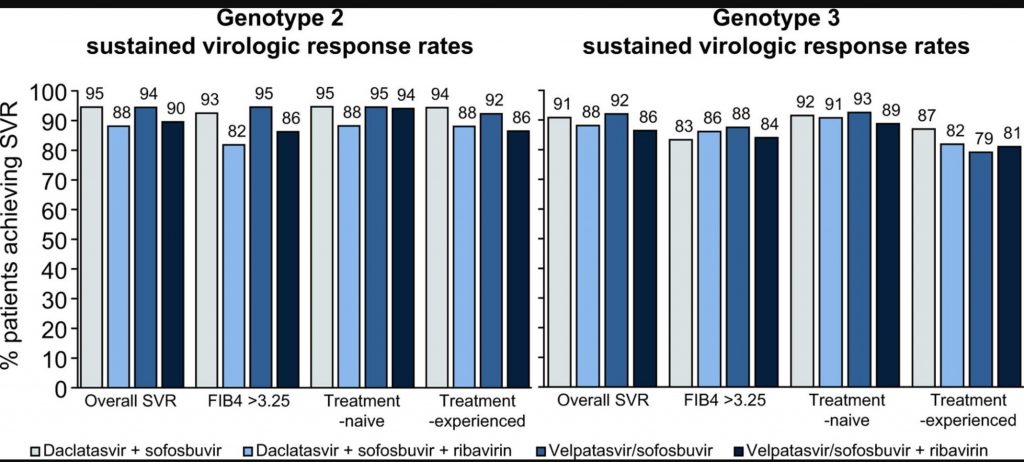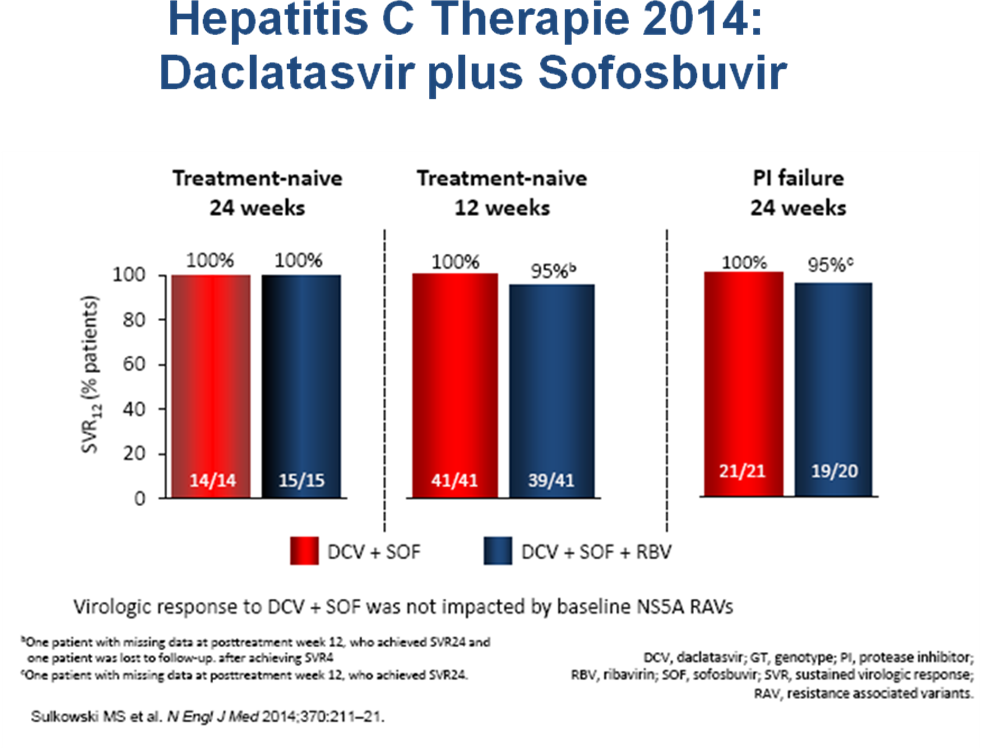Hepatitis C Blog
Greg Jefferys Hepatitis C blog deals with all the issues associated with hepatitis C
Hepatitis C Treatment and Ribavirin
- August 1, 2019
- By Greg Jefferys
- 0 Comment
Hepatitis C Treatment and Ribavirin.
Over the past year, there has been a lot of discussion about including Ribavirin with Direct Acting Antivirals (DAAs) in the treatment of Hepatitis C. In this article, I will show that there is no value at all in combining Ribavirin with DAAs in the treatment of Hepatitis C. Indeed, the research suggests that adding Ribavirin actually reduces the Hepatitis C cure rates in many situations.
Background on the use of Ribavirin for Hep C Treatment
Because adding Ribavirin definitely improved the effectiveness of Interferon based treatment of Hepatitis C there has been the idea that adding Ribavirin to Sofosbuvir based treatments such as Epclusa or Sofosbuvir + Daclatasvir would be a good idea. This despite the fact that Ribavirin is a highly toxic drug with many, many potentially dangerous side effects. After several years of monitoring the treatment of Hepatitis C patients being treated with the combination of DAAs the evidence is in that adding Ribavirin to modern Hep C treatment has no value in almost every situation. The graph below is from an article published in the Journal of Hepatology in January 2019 called: Real-world effectiveness of daclatasvir plus sofosbuvir and Velpatasvir/Sofosbuvir in hepatitis C genotype 2 and 3. This study was of over 5,000 patients being treated by the USA Department of Veterans Affairs and shows that adding Ribavirin actually reduces cure rates in patients with G2 and G3.

This graph shows clearly shows the results of over 5,000 people with Hepatitis C being treated with and without Ribavirin. The results show that the use of Ribavirin actually reduces cure rates. So why use a toxic drug that reduces Hep C cure rates?
Hep C Treatment with Sofosbuvir + Daclatasvir with and without Ribavirin

The graph above from a 2014 study shows that adding Riabvirin to a Hepatitis C treatment using Sofosbuvir + Daclatasvir can reduce cure rates by 5%
There have been numerous studies that show that adding Ribavirin to Sofosbuvir based Hepatitis C treatment can reduce the cure rates.
The study by Sulkoski et al. also shows a five percent reduction in cure rates for people who added Ribavirin to their Hepatitis C treatment with Sofosbuvir + Daclatasvir.
| Sulkowski et al.(AI444040)7 | DCV+SOF for 12 weeks vs. DCV+SOF+RBV for 12 weeks | 100% vs. 95% | |
| DCV+SOF for 24 weeks vs. DCV+SOF+RBV for 24 weeks | 100% vs. 95% | ||
https://www.nejm.org/doi/10.1056/NEJMoa1306218
Just How Toxic is Ribavirin
Below is a long, long list of the side effects of Ribavirin and the damage it can do.
The toxicity of Ribavirin is not debated. Everyone agrees that Ribavirin is a very toxic chemical. However, the argument has always been that the risk of damage from Ribavirin’s toxicity is offset by the fact of its antiviral qualities.
This argument cannot be used in the case of Hepatitis C treatment because there is no benefit in adding Ribavirin to Sofosbuvir based Hepatitis C treatment. Indeed there is a distinct disincentive to adding Ribavirin to Hep C treatment because adding Ribavirin reduces cures rates!
So why would anyone consume a toxic drug that reduces their chance of a cure? Why would any doctor prescribe a toxic drug that reduces cure rates?
Hell… I don’t know the answer; maybe it’s just plain ignorance? Maybe it’s a disinformation campaign by the manufacturers of Ribavirin?
I don’t know why… it seems crazy to me and it is the reason I am taking the time to write this post, so people know the truth about Ribavirin.
The Side effects of Ribavirin
It is important that a male taking Ribavirin should not cause pregnancy during the use of Ribavirin. It is also important that a female should not fall pregnant during the time she is using Ribavirin. There is a risk that Ribavirin will cause genetic defects and pregnancy should not be considered until at least 6 months after the end of treatment with Ribavirin.
A negative pregnancy test is needed in women who are of childbearing age before starting treatment with Ribavirin. Two forms of birth control must be used together during treatment and for 6 months after treatment ends. You will need to have pregnancy tests done regularly to make sure you are not pregnant while being treated with this medicine and for at least 6 months after your treatment ends
Do not use Copegus® in combination with didanosine (Videx®, Videx® EC). Using these medicines together may cause serious medical problems.
Ribavirin may cause some people to be agitated, irritable, or display other abnormal behaviours. In Hep C circles we call this “Riba Rage”.
It may also cause some people to have suicidal thoughts and tendencies or to become more depressed.
Check with your doctor right away if you have back, leg, or stomach pains; bleeding gums; chills; dark urine; difficulty breathing; fever; general body swelling; headache; loss of appetite; nausea or vomiting; nosebleeds; pale skin; sore throat; unusual tiredness or weakness; or yellowing of the eyes or skin. These could be symptoms of a blood disorder called anaemia, which is caused by Ribavirin.
This medicine may cause serious types of allergic reactions, including anaphylaxis. Anaphylaxis can be life-threatening and requires immediate medical attention. Stop taking this medicine and call your doctor right away if you or your child have itching, hives, hoarseness, trouble with breathing, trouble with swallowing, or any swelling of the hands, face, or mouth while you are using this medicine.
Serious skin reactions can occur with this medicine. Check with your doctor right away if you or your child have blistering, peeling, or loosening of the skin; fever or chills; hives or welts; red skin lesions; a severe skin rash or acne; or sores or ulcers on the skin while you are using this medicine.
Pancreatitis may occur while you are using this medicine. Stop using this medicine and check with your doctor right away if you or your child have sudden and severe stomach pain, chills, constipation, nausea, vomiting, fever, or light-headedness.
You should not drink alcoholic beverages (including beer, wine, or liquor) while you are taking this medicine.
This medicine may cause some people to become dizzy, drowsy, or less alert than they are normally. Make sure you know how you react to this medicine before you or your teenager drive, operate machinery, or do anything else that could be dangerous if you are not alert.
Check with your doctor if blurred vision, decreased vision, or any other change in vision occurs while you or your child are using this medicine. Your doctor may want you to have your eyes checked by an ophthalmologist (eye doctor).
- If you can, avoid people with infections. Check with your doctor immediately if you think you are getting an infection or if you get a fever or chills, cough or hoarseness, lower back or side pain, or painful or difficult urination.
- Check with your doctor immediately if you notice any unusual bleeding or bruising; black, tarry stools; blood in the urine or stools; or pinpoint red spots on your skin.
- Be careful when using a regular toothbrush, dental floss, or toothpick. Your medical doctor, dentist, or nurse may recommend other ways to clean your teeth and gums. Check with your medical doctor before having any dental work done.
- Do not touch your eyes or the inside of your nose unless you have just washed your hands and have not touched anything else in the meantime.
- Be careful not to cut yourself when you are using sharp objects such as a safety razor or fingernail or toenail cutters.
- Avoid contact sports or other situations where bruising or injury could occur.
Side Effects
Along with its needed effects, a medicine may cause some unwanted effects. Although not all of these side effects may occur, if they do occur they may need medical attention.
Check with your doctor immediately if any of the following side effects occur:
- Anxiety
- black, tarry stools
- body aches or pain
- chest pain
- congestion
- cough or hoarseness
- crying
- depersonalization
- diarrhea
- difficult or laboured breathing
- discouragement
- dry mouth
- dryness of the throat
- dysphoria
- euphoria
- feeling sad or empty
- feeling unusually cold
- fever or chills
- general feeling of discomfort or illness
- headache
- hyperventilation
- irregular heartbeats
- irritability
- joint pain
- lack of appetite
- loss of interest or pleasure
- lower back or side pain
- mental depression
- muscle aches and pains
- nausea
- nervousness
- painful or difficult urination
- pale skin
- paranoia
- poor concentration
- quick to react or overreact emotionally
- rapidly changing moods
- restlessness
- right upper abdominal or stomach pain
- runny nose
- shaking
- shivering
- shortness of breath
- sleeplessness
- sore throat
- sores, ulcers, or white spots on the lips or in the mouth
- sweating
- tender, swollen glands in the neck
- tightness in the chest
- trouble with concentrating
- trouble with sleeping
- trouble with swallowing
- troubled breathing with exertion
- unable to sleep
- unusual bleeding or bruising
- unusual tiredness or weakness
- voice changes
- vomiting
- wheezing
- Bleeding gums
- blood in the urine or stools
- constipation
- depressed mood
- dry skin and hair
- feeling cold
- hair loss
- husky voice
- muscle cramps and stiffness
- pinpoint red spots on the skin
- right upper abdominal or stomach fullness
- slowed heartbeat
- weight gain
- Acid or sour stomach
- being forgetful
- belching
- blurred vision
- bone pain
- change in taste or bad, unusual, or unpleasant (after) taste
- cracked, scaly skin
- crusting, irritation, itching, or reddening of the skin
- difficulty with moving
- dizziness or light-headedness
- feeling of constant movement of self or surroundings
- hair loss or thinning of the hair
- heartburn
- indigestion
- lack or loss of strength
- menstrual changes
- pain or tenderness around the eyes and cheekbones
- rash
- sensation of spinning
- sneezing
- stomach discomfort, upset, or pain
- stuffy nose
- swelling
- swollen joints
- weight loss
- Back pain
- burning, dry, or itching eyes
- discharge, excessive tearing
- feeling of warmth
- redness of the face, neck, arms, and occasionally, upper chest
- redness, pain, swelling of the eye, eyelid, or inner lining of the eyelid
- skin rash, encrusted, scaly, and oozing
Hep C Treatment Ribavirin, Hepatitis C Treatment Ribavirin
- Post Categories
- Uncategorized
Greg Jefferys
Join my Hep C Support Group.
Talk privately to other people
with Hep C in a closed group.
Disclaimer
Greg Jefferys’ blog is provided for informational purposes and is not intended as Medical advice, diagnosis, or treatment.
Whilst Greg Jefferys is doing a PhD it is not in medicine. Any advice offered is offered in good faith and based on an extensive general knowledge of Hepatitis C and access to generic Hepatitis medicines Greg Jefferys has acquired through his work as an advocate and activist
The Hep C Buyers Club is not a company or corporate entity but simply a loose structure intended to offer a free information to people with Hepatitis C
Other Books
Click here for other books by Greg Jefferys.
for Kindle
I have converted this diary into a kindle book for folk who might like it in that format. I have added a lot more depth than the original diary contains, it’s more of a complete story in book format. I have priced it as low as Kindle allows me to @ 99 cents. If you are interested just click here to go to the Kindle page.
Recent Posts
-
Motivate C a Profitable Hep C Initiative April 29, 2024
-
After Hep C Healthy Liver Diet September 4, 2023
-
Fear of Hep C Treatment April 14, 2023
-
My Letter to Joe Biden March 2, 2023
-
Dormant Hepatitis C November 27, 2022
-
How Much water to drink during Hep C treatment October 13, 2022
-
Hep C and Peripheral Neuropathy August 21, 2022
-
Fatigue Brain Fog and Hepatitis C August 18, 2022
-
Hep C and Liver Cancer May 18, 2022
-
Is it possible to beat Hep C naturally April 14, 2022
Contact Us
If you have any questions please reach out by email, or complete the below form.
Greg Jefferys3439 Channel Highway, Woodbridge, Tasmania, 7161.
Email: gregjefferys@outlook.com


